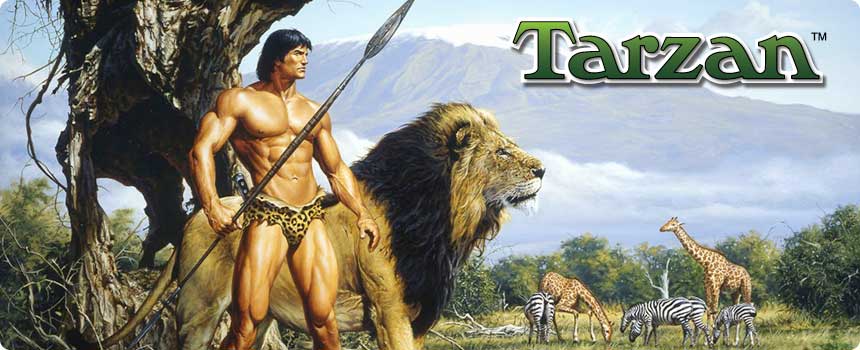Tarzan is the son of a British Lord and Lady who were marooned on the West coast of Africa by mutineers. When Tarzan was a year old, his mother died of natural causes, and his father was killed by Kerchak, leader of the ape tribe into which Tarzan was adopted. Tarzan’s tribe of apes is known as the Mangani, Great Apes of a species unknown to science. Kala is his ape mother. Tarzan (White-skin) is his ape name; his English name is John Clayton, Lord Greystoke (the formal title is Viscount Greystoke according to Burroughs in Tarzan, Lord of the Jungle; Earl of Greystoke in later, non-canonical sources, notably the 1984 movie Greystoke). In fact, Burroughs, as narrator of Tarzan of the Apes, describes both Clayton and Greystoke as fictitious names – implying that, within the fictional world that Tarzan inhabits, he may have a different real name.
As a young adult, Tarzan meets a young American woman, Jane Porter, who along with her father and others of their party is marooned at exactly the same spot on the African coast where Tarzan’s parents were twenty years earlier. When she returns to America, he leaves the jungle in search of her, his one true love. In later books, Tarzan and Jane marry and he lives with her for a time in England. They have one son, Jack, who takes the ape name Korak (“the Killer”). Tarzan is contemptuous of the hypocrisy of civilization, and he and Jane return to Africa, making their home on an extensive estate that becomes a base for Tarzan’s later adventures.
In Tarzan, Burroughs created an extreme example of a hero figure largely unalloyed with character flaws or faults. He is described as being Caucasian, extremely athletic, tall, handsome, and tanned, with grey eyes and black hair. Emotionally, he is courageous, loyal and steady. He is intelligent and learns new languages easily. He is presented as behaving ethically, at least by Burroughs’ definitions, in most situations, except when seeking vengeance under the motivation of grief, as when his ape mother Kala is killed in Tarzan of the Apes, or when he believes Jane has been murdered in Tarzan the Untamed. He is deeply in love with his wife and totally devoted to her; in numerous situations where other women express their attraction to him, Tarzan politely but firmly declines their attentions. When presented with a situation where a weaker individual or party is being preyed upon by a stronger foe, Tarzan invariably takes the side of the weaker party. In dealing with other men Tarzan is firm and forceful. With male friends he is reserved but deeply loyal and generous. As a host he is likewise generous and gracious. As a leader he commands devoted loyalty.
In contrast to these noble characteristics, Tarzan’s philosophy embraces an extreme form of “return to nature”. Although he is able to pass within society as a civilized individual, he prefers to “strip off the thin veneer of civilization”, as Burroughs often puts it. His preferred dress is a knife and a loincloth of animal hide, his preferred abode is a convenient tree branch which happens to be nearby when he desires to sleep, and his favored food is raw meat, killed by himself; even better if he is able to bury it a week so that putrefaction has had a chance to tenderize it a bit.
Tarzan’s primitivist philosophy was absorbed by countless fans, amongst whom was Jane Goodall, who describes the Tarzan series as having a major influence on her childhood. She states that she felt she would be a much better spouse for Tarzan than his fictional wife, Jane, and that when she first began to live among and study the chimpanzees she was fulfilling her childhood dream of living among the great apes just as Tarzan did.






